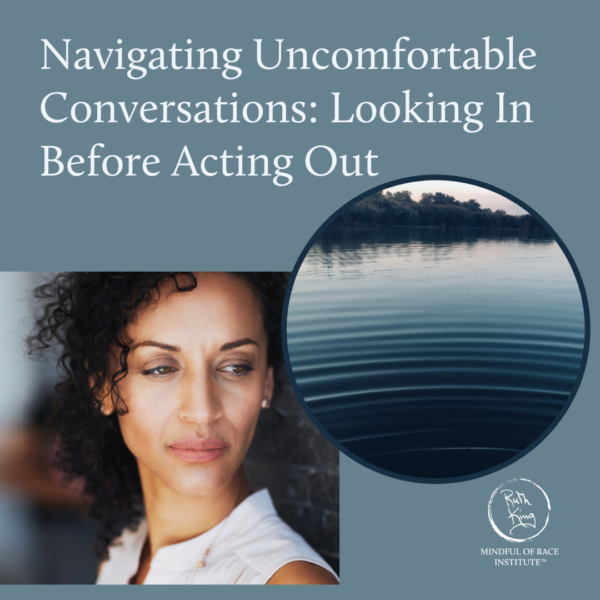When engaged in discussions that expose vulnerability and challenge our beliefs, the concept of "presence" becomes invaluable. Being present means immersing ourselves fully in the moment, without judgment or preconceived notions. It's about active listening, not just with our ears but with our hearts and minds.
Cultivating presence in the face of our own racial biases allows us to examine our own perspectives, views, and emotions. It enables us to set aside ego-driven reactions and make space for empathy and connection. Presence is an active and compassionate expression of engagement.
In the heat of uncomfortable conversations, emotions can run high. It's essential to allow pause and space in these exchanges. I invite you to revisit my blog from this time last year Calling Out, Inviting In: Difficult Conversations. It draws attention to the impact we have on others in challenging conversations. Being called out or calling someone else out never feels good. This blog offers a few reflective strategies for navigating these interactions more gracefully.
Pausing before reacting can prevent defensiveness and lead to more thoughtful engagement. Taking a moment to consider the impact of our own thoughts and feelings can lead to more personal growth and presence.
To build on the earlier blog, consider the following reflection from the "Mindful of Race" chapter "Talking about what disturbs you."
Looking In Before Acting Out
When you feel triggered, get quiet. Take a few deep breaths. Turn your attention inward. Have an attitude of curiosity and self-care. Now reflect on the following questions:
- Given this disturbance, what old traumas or wounds have been activated? Acknowledge and take care of them.
- What characteristics about this person or situation can you acknowledge as good or neutral? Can you see aspects of yourself, past or present, in the person or situation?
- What thoughts, emotions, or beliefs are you convinced of or do you overly identify with? What can you let go of to feel free?
- Are you taking this disturbance personally? Is this absolutely true?
- Do you believe this situation has always been or will be this way? Is that absolutely true?
- Can this situation be anything other than it actually is in this moment?
- Do you feel clear and stable enough to confront this disturbance without causing harm to others or yourself?
- What is your intention in confronting this disturbance? What outcome do you hope for? For example: Do you want to be right, to be better understood, to bridge separation, to reach agreement? Be clear about your intention without being attached to the outcome.
- Are you open to learning?
These reflections are meant to support you in staying present and curious about the experience you are having in this moment. You don't have to be distress-free before you have a difficult conversation, but you do want to enter it with clarity and stability.
Free Training: Let's Talk About Race
Learn more about how to cultivate presence and experience more inner freedom by watching my free webinar, “Let’s Let's Talk About Race: What to do with emotional distress.” Inside this 25-minute training, you’ll learn:
- When to press pause: Recognize the signs of nervous system dysregulation and discover how to reconnect with your body to prevent emotional overwhelm.
- Discomfort as competency: Understand why discomfort is important and learn to embrace your discomfort without running away, spinning out, or acting out.
- How to stay connected: Learn to stay connected with others and yourself by cultivating an inner atmosphere that is regulated, stable, and choiceful.
- How to deepen awareness: Learn more about how to deepen your practice of racial awareness and your impact on racial harmony.
Watch it for free today by clicking the link: https://ruthking.net/free-webinar/.
Join Us Online November 17-19 for:
Mindful of Race 101 + Live Time with Ruth!
Click here to enroll: https://ruthking.net/mindful-of-race-training/
Understanding how we have been conditioned to think and react is at the root of both racial distress and racial healing. ~ Ruth King

